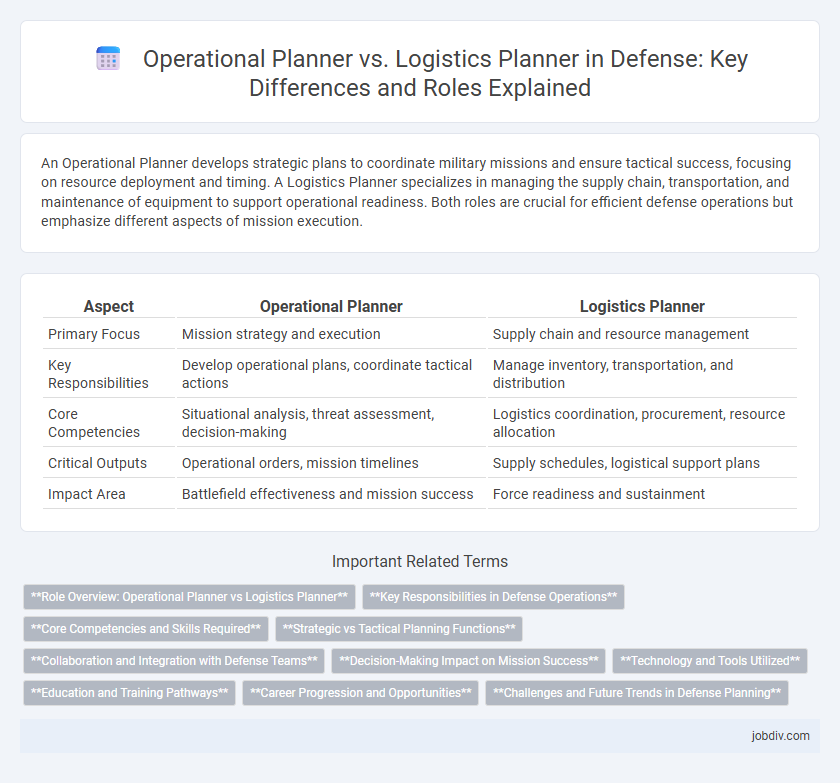An Operational Planner develops strategic plans to coordinate military missions and ensure tactical success, focusing on resource deployment and timing. A Logistics Planner specializes in managing the supply chain, transportation, and maintenance of equipment to support operational readiness. Both roles are crucial for efficient defense operations but emphasize different aspects of mission execution.
Table of Comparison
| Aspect | Operational Planner | Logistics Planner |
|---|---|---|
| Primary Focus | Mission strategy and execution | Supply chain and resource management |
| Key Responsibilities | Develop operational plans, coordinate tactical actions | Manage inventory, transportation, and distribution |
| Core Competencies | Situational analysis, threat assessment, decision-making | Logistics coordination, procurement, resource allocation |
| Critical Outputs | Operational orders, mission timelines | Supply schedules, logistical support plans |
| Impact Area | Battlefield effectiveness and mission success | Force readiness and sustainment |
Role Overview: Operational Planner vs Logistics Planner
Operational Planners design and coordinate mission strategies, aligning tactical objectives with available resources and intelligence to ensure successful military operations. Logistics Planners manage the supply chain, ensuring timely procurement, distribution, and maintenance of equipment, personnel, and materials critical for sustained operational readiness. Both roles are integral to mission success, with Operational Planners focusing on strategic execution and Logistics Planners ensuring the operational environment is fully supported and resourced.
Key Responsibilities in Defense Operations
Operational planners in defense focus on developing strategic and tactical plans to achieve mission objectives, coordinating troop movements, and managing combat resources. Logistics planners ensure the efficient supply chain management, including transportation, procurement, and maintenance of equipment and supplies essential for sustained military operations. Both roles are critical for seamless defense operations, with operational planners guiding combat execution while logistics planners maintain operational readiness through resource availability.
Core Competencies and Skills Required
Operational Planners require expertise in strategic analysis, mission planning, and resource allocation to develop effective defense operations that achieve tactical and strategic objectives. Logistics Planners must excel in supply chain management, transportation coordination, and inventory control to ensure timely delivery of materials and sustainment of military forces. Both roles demand strong problem-solving abilities, attention to detail, and proficiency in defense-specific software and communication systems.
Strategic vs Tactical Planning Functions
Operational planners concentrate on strategic planning functions, establishing long-term objectives and resource allocation to achieve overarching mission goals. Logistics planners focus on tactical planning functions, managing immediate supply chain operations, transportation, and support activities crucial for day-to-day mission success. Both roles integrate to ensure cohesive defense readiness by aligning high-level strategies with effective on-the-ground execution.
Collaboration and Integration with Defense Teams
Operational Planners collaborate closely with defense teams by designing comprehensive mission strategies that align with tactical and strategic objectives, ensuring seamless coordination across combat units and intelligence sectors. Logistics Planners integrate supply chain management with operational needs, coordinating transportation, equipment, and resource allocation to maintain continuous support and mission readiness. Both roles depend on synchronized communication and data sharing platforms to optimize decision-making and enhance overall defense capability.
Decision-Making Impact on Mission Success
Operational planners directly influence mission success by devising strategic and tactical plans that guide troop movements and engagement, optimizing resource utilization in real-time combat scenarios. Logistics planners ensure mission sustainability by coordinating supply chains, transportation, and equipment readiness, preventing operational delays due to resource shortages or distribution failures. Their decision-making interplay establishes a critical balance where strategic intent meets practical execution, enhancing overall mission effectiveness and adaptability in dynamic defense environments.
Technology and Tools Utilized
Operational planners rely heavily on advanced command and control systems, real-time data analytics platforms, and geospatial intelligence tools to coordinate mission execution and situational awareness. Logistics planners utilize integrated supply chain management software, inventory tracking technologies such as RFID, and automated transportation management systems to ensure efficient resource allocation and timely delivery. Both roles employ simulation technologies and AI-driven decision support systems tailored to their specific planning requirements in defense operations.
Education and Training Pathways
Operational Planners typically pursue education in military strategy, defense studies, or operational research, often through military academies or specialized defense institutions, followed by advanced training in mission planning and tactical decision-making. Logistics Planners focus on supply chain management, transportation, and resource allocation, obtaining degrees or certifications in logistics, business administration, or industrial engineering, complemented by practical training in inventory control and distribution systems. Both roles require continuous professional development through defense courses and simulation exercises to maintain effectiveness in dynamic operational environments.
Career Progression and Opportunities
Operational Planners often advance toward roles in mission command, strategic operations, or joint task force leadership, leveraging their expertise in tactical decision-making and scenario analysis. Logistics Planners typically progress into positions focused on supply chain management, resource allocation, and sustainment operations, with potential growth into senior logistics officer or materiel management roles. Both career paths offer opportunities for specialization, senior staff appointments, and promotion within defense planning and operational support frameworks.
Challenges and Future Trends in Defense Planning
Operational planners in defense face challenges such as rapidly evolving threat environments, real-time decision-making under uncertainty, and integration of multi-domain operations. Logistics planners contend with complexities in supply chain resiliency, resource allocation amid constrained budgets, and adoption of emerging technologies like autonomous systems and AI-driven analytics. Future trends emphasize digital transformation, predictive logistics supported by big data, and enhanced interoperability between operational and logistics planning to optimize mission readiness and response efficiency.
Operational Planner vs Logistics Planner Infographic

 jobdiv.com
jobdiv.com